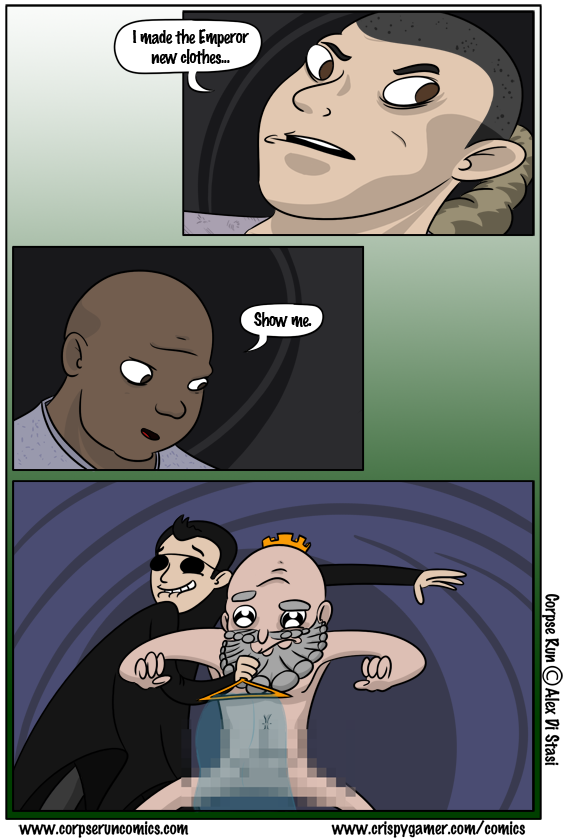Corpse Run 162: Exactly as I remembered
I know I say this pretty often (with alarming regularity, really), but I’m really getting the feeling that I’m going insane. Not throw excrement around while singing “Mary had a little lamb” insane, but rather the type of insane where my understanding of what is and isn’t appropriate has atrophied.
I need to get out more often and work those social muscles, my life depends on it.
So I had another super fun phone call today! Some high-school aged kid called the store and was asking about subwoofers. I said I’d be glad to help.
“Ok, so… I’m doing a science project, and I have to prove a theory.”
ooohhhhh here we go
“My theory is that very low and very high frequencies can damage hearing, and I-“
I decided to cut the kid off right there and told him that the frequency itself isn’t the cause of hearing loss, but listening to any sound at a loud enough volume could cause it.
“Well, that’s nice, but that doesn’t line up with my theory.”
“I’m sorry,” I said, “but I think your theory is wrong.”
Now, I’m not going to pretend that I’m some scientist or anything, but I feel pretty confident in saying that the only audio that can really damage your hearing is loud audio, not high or low frequencies.
I mean, let’s assume that high and low pitches did cause hearing loss. You mean to tell me that twice a year during elementary school hearing tests the New Jersey Department of Education was assaulting my fragile eardrums with their evil low hums and high whizzes?
After stating my opinion on the matter, things got weird.
“Ok, well, maybe not like, low and high pitches,” said the fresh, young lad, “but super low and high pitches.”
“How do you mean?”
“Like…2Hz or like… a billion Hz.”
“You can’t even hear those frequencies.”
“But…”
At this point an actual customer had come to my desk, so I had to get off the phone. I get the feeling that this student will assume he is correct, and throw out any information he finds that contradicts his… theory. I also get the feeling that he’ll be throwing out a lot of info.
By the by, can you hear better than I can? Follow this link and test out how high a frequency you can hear! I could only hear up to 14kHz… my ears are apparently lame.
Finally, Peter Thomas of Aquatic Ambience linked to me on his site! Awesome… and thanks! Make sure to drop by his review site!



Teenagers are idiots. I know my students are.
15 kHz
The following paragraph sums up like so: I don’t think either of you had enough evidence to really decide either way, and perhaps more caution would have been advisable.
(Here’s what I wrote first:)
Well, I think in this instance the kid may not have been wrong. Not to say that he was necessarily right, either, but I don’t think that one could say definitively one way or the other without research. Certainly, sounds would have to have a certain volume to damage your hearing, but it seems quite plausible that differing frequencies at a fixed volume could impact your hearing to a different extent. This would depend partially on how you defined “fixed volume.” For instance, fixing the amplitude (in the form of the average differences in pressure) and varying the pitch likely would show significantly greater hearing loss for higher frequencies, as more energy is transferred for said higher frequencies. Plus, if his theory was wrong, a correctly set up experiment should show that, justifying the experiment anyway. How he actually planned to DEMONSTRATE supposed hearing loss, I can’t guess.
I could consciously hear up to 19kHz, but I could feel my eardrums vibrating even at the highest frequency available, even if my cochlea couldn’t detect said vibration…
The kid’s idea is sort of like how light works with your eyes. So there’re really bright lights that can hurt your eyes from overload. But then there’s also some light that your eyes can’t detect at either end of that spectrum (UV and IR) that can also damage your eyes even though you can’t see them and even though they’re not in extremely high volume.
It’s not quite the same idea with audio. Generally, decibel and frequency both affect things, and, if I understand right, higher frequencies don’t need as high a decibel level to cause damage. So I guess if my understanding’s right, then a high enough frequency could be damaging at a low decibel.
On the other hand, there’s also some research that’s apparently shown that low-frequency sound that we can’t hear is actually damaging to our hearing, too. Or it makes the ear more susceptible to damage, which is basically the same thing if it makes regular sound cause damage.
Of course, there’s also been some research that’s shown that, despite the loss our ears develop, our brain continues to refine its mapping to our senses so that when we’re older, we actually are able to detect more than when we’re younger, loss aside. Which is why your octogenarian great-grandmother—who can’t hear you talking to her across the dinner table—can still hear you playing on a muted CRT television in the middle of the night.